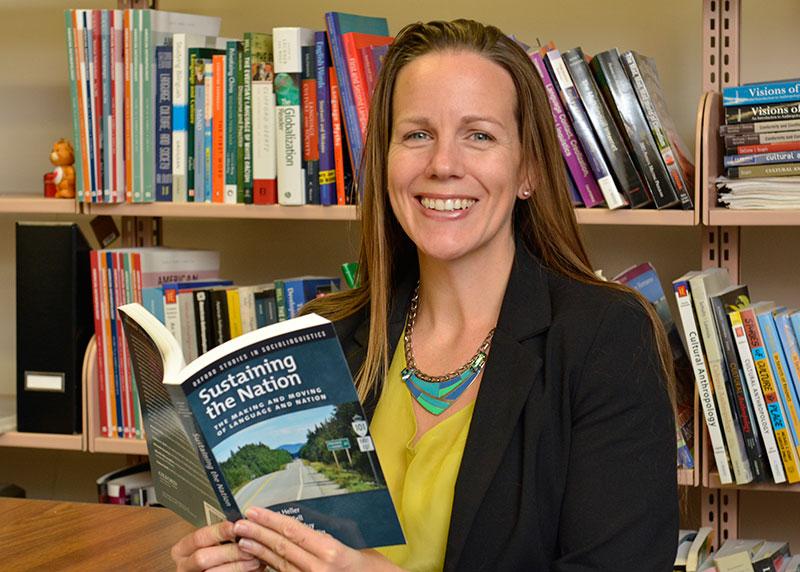Strategic migration—Lindsay A. Bell of SUNY Oswego’s anthropology faculty and four other researchers sum up their examination of French-speaking minorities in Canada in a new book titled “Sustaining the Nation: The Making and Moving of Language and Nation” published by Oxford University Press. The team interviewed hundreds of French-speaking, non-Quebecois minorities to examine trends in globalization, mobility, culture and language among people who have experienced repeated economic displacements.
SUNY Oswego anthropology faculty member Lindsay A. Bell has co-authored a book that traces labor mobility among French-speaking Canadians across the broad sweep of the country, from Alberta oil sands and Arctic diamond mines to a fishing-and-tourism village in New Brunswick.
A five-person research team produced “Sustaining the Nation: The Making and Moving of Language and Nation” for Oxford University Press, examining migration of francophone minorities living outside the province of Quebec. It is part of the Oxford Studies in Sociolinguistics series.
Bell, joined by her dissertation supervisor—University of Toronto professor Monica Heller—and three other researchers, set out in 2009 to study how social difference—race, ethnicity, language, gender—has been used to sort out who must or can be mobile and who must or can remain in place in the organization of the global circulation of human and natural resources. The book uses the experiences of French ethnic minorities to examine the increasing difficulty of maintaining the construct of “nation” in the globalized economy.
Bell formerly taught in a French-speaking school above the 60th parallel, so she was familiar with the French-Canadians of the Northwest Territories, which is not what most people think of as French Canada. At the same time, then-fellow doctoral student Mireille McLaughlin was interested in the eastern francophones, specifically Acadians.
“As Mireille and I spoke we saw many connections between our two seemingly distant sites,” Bell said. “Often people from out east spent time earning and saving money in the north. Our supervisor, Monica, long interested in the transformation of francophone Canada, challenged us: ‘How can we tie both of your pieces together?’ It seemed like our findings were telling us we had to. We realized even the three of us couldn’t cover the issues. We enlisted professor Michelle Daveluy of Universite Laval, who is an expert on Franco-Albertans, and Hubert Noel, a doctoral candidate whose focus is Acadian cultural production.”
Through interviews across Canada with hundreds of people, the researchers studied impacts on francophone families, language and culture among those whose forebears remained in Canada, distinct from the French in Quebec.
Ethnic tourism
Members of French-speaking minorities outside Quebec historically have moved where jobs in natural resources are, Bell said. Through generations of economic displacements and long stigmatization, they have found ways to maintain their dialects and cultures—even in the sub-Arctic oil sands of Alberta and in the Arctic mines of resource-rich Northwest Territories. Many of them eventually return to homes in northeastern Canada and northern Ontario, which have witnessed a modern phenomenon that, far from erasing francophone culture, actually has tried to turn it into something unique that can be sold.
“When the secondary economy collapsed in eastern Canada, two clear strategies (for francophone minorities) emerged,” Bell said. “First, leave and find work elsewhere—a very old strategy—or second, develop local heritage tourism, which could keep people at home. All of a sudden, with interest in tourism, linguistic difference became something that could make the east have added value in the global market. We are seeing a rise in this type of economic development strategy all over the world, what we can shorthand as ethnic tourism.”
One of the book’s central characters is a French-speaking woman from northern Ontario who had taught with Bell in the past in a francophone school in the Canadian North. As men in Ontario were laid off in paper mill shutdowns, the woman’s family migrated to the Northwest Territories to mine diamonds or work in related jobs such as construction. As a teacher, she became the breadwinner and tried to find work for family members, including nieces and nephews. “She felt personally responsible for a very extended network of family members,” Bell said. “She’s such a courageous woman.”
As a post-script to interviews for the book, Bell said, the woman and her husband moved back home to Ontario, where they opened a hunting lodge. Thanks to their moves over the years, they are able to provide bilingual service to their clients, many of whom are American. “They transitioned from resource work into tourism, but they had to save up the money,” Bell said. “They sort of came full circle in the two main economic strategies we see among francophone minorities from these regions.”
Bell said her experience with the far-flung nature of the research for “Sustaining the Nation” shows the need for teamwork in modern ethnographic anthropology.
“You need to be creative. The old style of anthropology, where I’m just going to sit in a village and learn something, that’s over, I think,” she said. “People want the answers to contemporary questions. I think anthropology can answer the big questions of our time, but I think methodologically we have to experiment with multi-sitedness and collaboration in new ways.”




